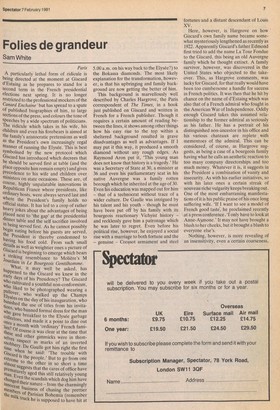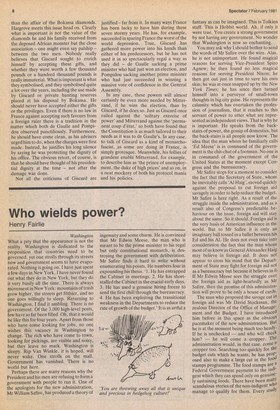Fs:Ales de grandeur
Sam White
Paris A particularly lethal form of ridicule is being directed at the moment at Giscard d'Estaing as he prepares to stand for a second term in the French presidential elections next spring. It is no longer restricted to the professional mockers of the Canard Enchaine but has spread to a spate of published biographies of him, to large sections of the press, and colours the tone of Speeches by a wide spectrum of politicians. The ridicule which takes in his wife, his Children and even his forebears is aimed at the family's aristocratic pretensions as well as the President's own increasingly regal manner of running the Elysee. This is best Symbolised by the new protocol which Giscard has introduced which decrees that he should be served first at table (and the Place opposite him remain empty) and gives precedence to his wife and children over ministers on state occasions. These are, of Course, highly unpalatable innovations in Republican France where presidents, like ordinary, hosts, were always served last and Where the President's family holds no official status. It has led to a crop of rather heavy jokes about the advantages of being Placed next to 'the gap' at the presidential dinner table and the self sacrifice involved in being served first. As he cannot possibly begin eating before his guests are served, the President is thereby condemned to having his food cold. From such small details as well as weightier ones a picture of Giscard is beginning to emerge which bears a striking resemblance to Moliere's M Jourdain in Le Bourgeois Gentilhomme, , What, it may well be asked, has happened to the Giscard we knew in the early days of his Presidency? The Giscard Who cultivated a youthful non-conformism, who liked to be photographed wearing a 1.1tIllover, who walked up the Champs lysees on the day of his inauguration, who banished the use of titles from his invitatvviohns, who banned formal dress for the man gave breakfast to the Elysee garbage `...,o_llectors, and made it a point to dine out lui,nc7e a month with 'ordinary' French famitLs. Of course it was clear at the time that `1se and other gimmicks were in them';'_v,ea suspect as marks of an inverted tlifiThetY. De Gaulle got him right the first clutisce when he said: 'The trouble with extr ard is the people.' But to go from one rne to the other in so short a time pirme almost suggests that the cares of office have an, Maturely aged this still relatively young eir_ven the scandals which dog him have innoneged their nature — from the charmingly members ent business of chasing the prettier —embers the . of P,arisian Bohemia (remember milk truck he is supposed to have hit at 5.00 a.m. on his way back to the Elysee?) to the Bokassa diamonds. The most likely explanation for the transformation, however, is that his upbringing and family background are now getting the better of him. This background is marvellously well described by Charles Hargrove, the Paris correspondent of The Times, in a book just published on Giscard and written in French for a French publisher. Though it requires a certain amount of reading between the lines, it shows among other things how his easy rise to the top within a sheltered background resulted in grave disadvantages as well as advantages. If I may put it this way, it produced a smooth diamond without any rough edges. As Raymond Aron put it, 'This young man does not know that history is a tragedy.' He was a Secretary of State at 30, a minister at 36 and even his parliamentary seat in his native Auvergne was a family rotten borough which he inherited at the age of 30. Even his education was mapped out for him — that of a technocrat without trace of a wider culture. De Gaulle was intrigued by his talent and his youth — though he must have been put off by his family with its bourgeois reactionary Vichyist history — and recklessly gave him a patronage which he was later to regret. Even before his political rise, however, he enjoyed a social rise with a marriage to both fortune and the — genuine — Creusot armament and steel fortunes and a distant descendant of Louis XV.
Here, however, is Hargrove on how ' Giscard's own family name became somewhat mysteriously lengthened as recently as 1922. Apparently Giscard's father Edmond first tried to add the name La Tour Fondue to the Giscard, this being an old Auvergne family which he thought extinct. A family survivor, however, was discovered in the United States who objected to the takeover. This, as Hargrove comments, was lucky for Giscard, for that really would have been too cumbersome a handle for success in French politics. It was then that he hit by chance on the name of d'Estaing which was also that of a French admiral who fought in the American War of Independence. Oddly enough Giscard takes this assumed relationship to the former admiral as seriously as his father. He has a portrait of his distinguished non-ancestor in his office and his various chateaux are replete with mementoes of the admiral. This can be considered, of course, as Hargrove suggests, as being a case of a bourgeois family having what he calls an aesthetic reaction to too many company directorships and too much money. Whatever it is, it suggests in the President a combination of vanity and insecurity. As with his earlier initiatives, so with his later ones a certain streak of nouveau riche vulgarity keeps breaking out. One of the most embarrassing manifestations of it is his public praise of his once long suffering wife. 'If I want to see a model of French good taste', he proclaimed recently at a press conference, 'I only have to look at Anne-Ay,mone.' It may not have brought a blush to her cheeks, but it brought a blush to everyone else's.
Nothing, however, is more revealing of an insensitivity, even a certain coarseness, than the affair of the Bokassa diamonds. Hargrove meets this issue head on. Clearly what is important is not the value of the diamonds he and his family received from the deposed African monster but the close association – one might even say palship – between the two men. Nobody really believes that Giscard sought to enrich himself by accepting these gifts, and whether they were worth a few thousand pounds or a hundred thousand pounds is really immaterial. What is important is what they symbolised; and they symbolised quite a lot over the years, including the use made by Giscard or private hunting reserves placed at his disposal by Bokassa. He should never have accepted either the gifts or the privileges. Even if there is no law in France against accepting such favours from a foreign ruler there is a tradition in the matter which both de Gaulle and Pompidou observed punctiliously. Furthermore, he should have come clean, as his advisers urged him to do, when the charges were first made. Instead, he justifies his long silence by saying he was protecting the dignity of his office. The obvious retort, of course, is that he should have thought of his presidential dignity at the time – not after the damage was done.
Not all the criticisms of Giscard are justified – far from it. In many ways France has been lucky to have him during these seven stormy years. He has, for example, succeeded in sparing France the worst of the world depression. True, Giscard has gathered more power into his hands than either of his predecessors, but he has not used it in so spectacularly regal a way as they did – de Gaulle sacking a prime minister who had just won an election, and Pompidou sacking another prime minister who had just succeeded in winning a massive vote of confidence in the General Assembly.
In any case, these powers will almost certainly be even more needed by Mitterrand, if he wins the election, than by Giscard, if he does so. Just as Giscard once railed against the 'solitary exercise of power' and Mitterrand against the 'permanent coup d'etat,' so both have found that the Constitution is as much tailored to their needs as it was to de Gaulle's. In any case, to talk of Giscard as a kind of monarchofascist, as some are doing in France, is simply grotesque. Meanwhile, his follies of grandeur enable Mitterrand, for example, to describe him as 'the prince of unemployment, the duke of high prices' and so on, in a neat mockery of both his protocol mania and his policies.







































 Previous page
Previous page